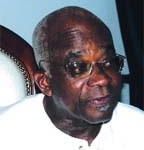The abandoned ‘Strategic Energy Plan 2005 - 2025’ put together by Kofi Asante, the former Executive Secretary of the Energy Commission had predicted that Ghana would face critical energy shortages between 2005 and 2008.
The drop in the water level of the Akosombo Dam and the resultant power rationing, which is having a biting effect on industry is perhaps, a foretaste of what is to come.
The document which was submitted to government in April 2005, just at the time Mr. Asante was sent packing recommended that Ghana should place herself in a position to be able to raise private capital required for investment in the power industry, at least in the short term.
“The burden falls on the government, the local financial institutions and the banks, pension funds; and the fledging capital markets etc to raise the capital”, says the document.
The need for private sector in volvement in financing the energy sector is part of the nine- year short-term energy plan outlined in the Strategic National Plan, which encourages private sector investments in the power industry in the short-term. “We need to rethink new ways of raising local capital for the necessary financing and investment”, says the plan.
Last week, the Executive Chairman of the Private Enterprise Foundation, Dr. Boye Ocansey was heard on radio encouraging the private sector to take advantage of the numerous financing avenues outlined in the 2006 budget and invest in the energy sector. Dr. Ocansey specifically tasked the financial institutions to lead the way in investing in the energy sector.
According to the Strategic National Energy Plan, it will be in the interest of Ghana to consider imposing a power levy on electricity consumers to raise part of the investment required. It says China, for instance, has had to impose a levy on its population for the development and construction of ‘Three Gorges Dam.’ “The greatest challenge, then, in moving forward the power industry to meet demand in the 21st century is to secure the required financing and investment now” the document emphasizes.
With the power of hindsight, even if feasible, consumers are likely to resist any more levies due to the failure of the utility companies to utilize previous levies - the street lights levy, rural electrification levy etc, which have been poorly utilised.
Meanwhile demand for energy will see no end, as the country gears up for accelerated growth targeting a GDP per capital of $1000 by 2012. Under the Medium Economic Growth Scenario (MEGS), the Strategic Plan forecasts that a $1000 capital growth would be achieved in 2025 instead of 2012. It therefore gives a GDP growth rate of 6.60 percent per annum over the forecast period. The population growth rate would be 2.67 percent, according to 1984-2000 population growth rates.
The population is therefore expected to increase from 18.9 million in 2000 to 36.5 million in 2025. A World Bank projection estimates the country’s population at 36.5 million by 20205. The number of households is expected to increase from 3.70 million (2000) to 6.78 million (2025). At the same time, the proportion of urban households is expected to increase from 47.4 percent (2000) to 59.8 percent (2025). As is common with urban life, the greater proportion of households is expected to increase demand for electricity.
The basic assumption here is that, while the country is expected to achieve a GDP per capita of $1000 in 2012 and then to $2,773 (2025) and an overall growth of 8.16 percent, the demand for energy is expected to more than double. No doubt, a number of critical issues will come up as the country grapples with the energy threat. First, is the environment and sustainable development, the New Valco, which is expected to be an integrated aluminium industry and its expected excessive use of energy and lastly, the demand side management. The Strategic Plan points out that for Ghana to achieve sustainable development, as energy impacts on the environment, the country must adopt energy production that embrace new technology.
In the plan, the Energy Commission did not mention the nuclear option and advance fossil systems, but perhaps, this is the time to start looking at that option, as Iran is bent on doing, though controversially. The Nuclear Non-Proliferation Treaty (NPT) allows signatories to enjoy the benefits of civilian nuclear technology.
The challenge for Ghana is to generate and supply sufficient energy for economic development and equitable social progress without destroying the environment or destroying people’s livelihoods, as the construction of the Akosombo dam did.
General News of Monday, 11 September 2006
Source: Public Agenda
Energy crisis prophesy comes true

















